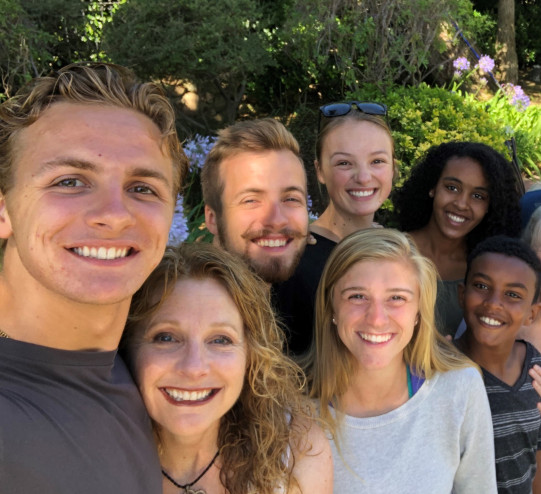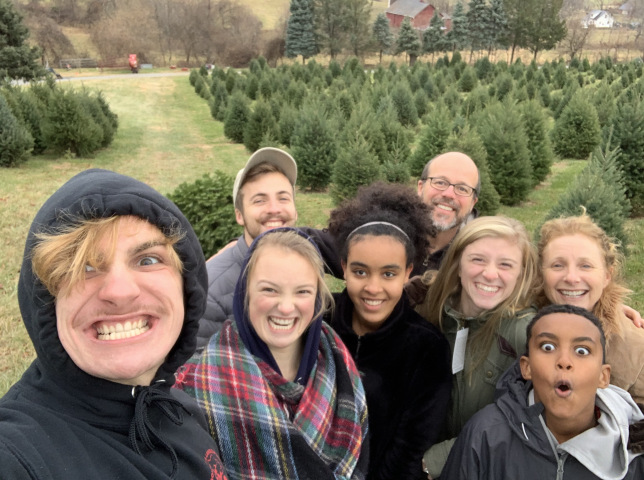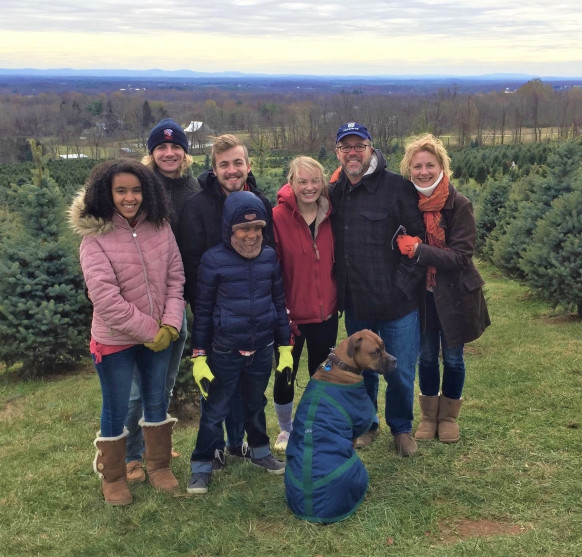Heather Frommack was driving when she heard her son Daniel pipe up from the back seat: “You know, Mom, I think I have Daddy’s feet.”
Musings like this would have been endearing under any circumstance. But the “aww” factor was multiplied coming from Daniel, whom Heather and her husband adopted from Ethiopia as a baby.
“There was just a sense for a long time that our family wasn’t complete,” Heather said. She and her husband, Tom, knew families from church and the community who had adopted. After some divinely orchestrated experiences, Heather and Tom began their own prayerful pursuit of adoption.
Four years later, they flew to Ethiopia to meet 4- and 1-year-old siblings Milkana and Daniel. According to the Ethiopian government’s adoption laws at the time, Heather and Tom had to wait six weeks between this initial visit and the day they could bring their adopted children home.
This waiting period was difficult, but in retrospect, Heather was thankful for the time to process her family’s new reality.
“I don’t think I’d recognized how strong our family identity was prior to meeting our adopted children, or how radically we were going to have to redefine that,” she explained. “One of the things you learn when you’re going through adoption training is that when you become a transracial family, you become what they call a conspicuous family. . . . So yes, leaving them was hard, but it was also an opportunity to go home and reckon with the realization that this was going to be a powerful change in our family.”
At the time of their adoption, the Frommack’s three biological children were 15, 13, and 10 years old. Adjusting to the family’s new level of visibility, the needs of two non-English-speaking children, and the subsequent demands on mom’s time, was not easy for the oldest three.
Tom and Heather tried their best to prepare their biological kids, but according to Heather, “It’s like preparing for any child to come into your life—you can talk about it, you can have the room ready, you can read all the books, but there’s just no way to be completely ready. . . . Eventually you just have to go live it.”
Still, there were a few factors she considered key to helping her family prepare for and settle into their new normal, first being a concept called “Shark Music,” introduced to her at an Empowered to Connect conference.
“They show you a first-person video. You’re walking through this lovely little path in the woods, and there’s this very peaceful, calming music in the background. It’s a sunny day, and you end up meandering through the woods to a lake,” Heather described. “They stop the video and ask everybody how they feel, and people say, ‘It feels great!’ Then they show the exact same video, but now they play the theme music from Jaws, and all the sudden you feel this ominous sense—like something’s going to jump out at you at any moment.
“It has really helped to remember that our adopted children may be bringing shark music into the experience. From our perspective—circumstantially—everything is fine, but in the hearts and minds of our adopted children, this may be a trigger of some kind.”
Heather also found herself heavily relying upon the adoption community for both emotional and practical support. “Having people in your life who really understand the process and can mentor you through it is really important. It also allows your children to see other adoptive families and normalize that experience.”
When new kids join the picture, especially those transplanted from an entirely different life and culture, old routines and activities will naturally be interrupted. For Heather, having friends who were willing to step in and take her kids to soccer practice, or just out for a normal playdate, helped ease the adjustment for the whole family.
“It’s really important to recognize that no matter how much you prepare ahead of time, you need to do your best to hunker down when you bring those kids home,” Heather said. “You have to be very focused on building this new family.”

Homeschooling proved to be an incredibly effective catalyst for solidifying the Frommack’s new family identity. “By homeschooling, you are giving your adopted children the full advantage of your presence and opportunity for attachment. . . . I do think homeschooling enabled our adopted children to embrace our family identity faster, and it allowed our biological children to do the same with their adopted siblings.”
Heather went on to explain that it was the shared experiences allowed by homeschooling that gave her children added opportunity to bond. “We use the same grammar program, the same co-op class, the same breakfast routine or chore routine—all these small things build into a family identity, and I think homeschooling enables that to evolve more easily than if you’re separated from one another for long periods of time.”

As the Frommacks learned to be united in their new family identity, Heather believed they gained a deeper understanding of cultural unity as well. “I think it’s facilitated a love for other cultures within our family and our hearts that we might not have had otherwise.”
“It’s also been a rich opportunity to be a walking testimony of how Christ’s love couldn’t care less about the color of skin or country of origin or hair texture—any of that stuff—it just doesn’t matter! He loves us and we love each other! And I think we can know this is true in our heads, but since we’ve had the chance to experience it on this intimate level, it has become a part of the fabric of our lives in ways that we might not have otherwise known. “

That’s clearly been the case for Daniel, who, at six years old, looked at Heather and said, “You know mommy, sometimes I forget that I wasn’t borned from you.”
—Rebekah
Photo Credit: Photos courtesy of Frommack family.
This will be an ongoing series on adoption and foster care. Stay tuned for future posts!

